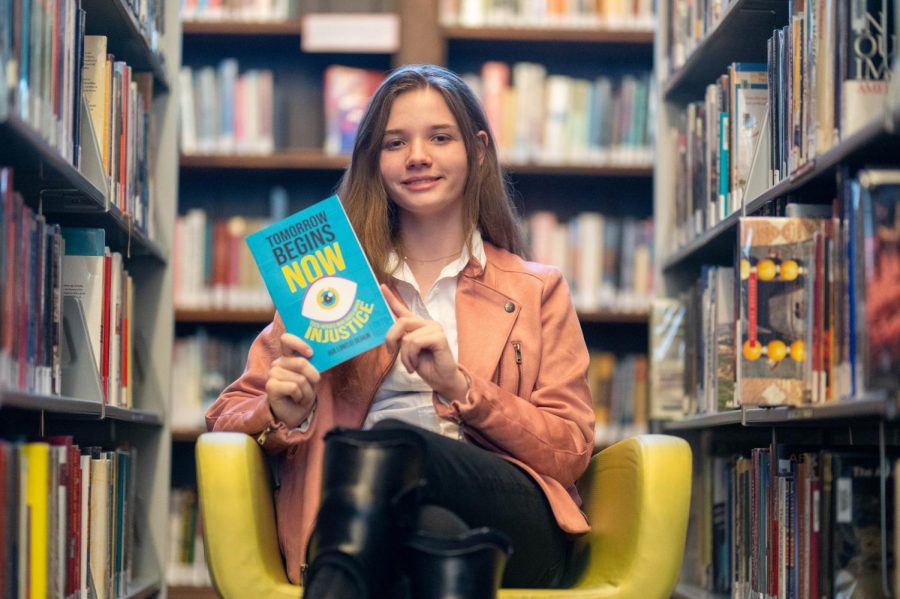Accessibility advocate: Student reflects on fight for disability rights in published book
After spending four years as the lead plaintiff in a federal discrimination lawsuit, senior Lorelei Deakin continues to advocate for disabled students.
January 30, 2023
Sitting in front of the City of Chicago Zoning Board Association in 2019, Lorelei Deakin grew increasingly nervous and tense waiting for her turn to speak. She had spent months researching and reviewing a comprehensive timeline of disability rights, but she still had a strange feeling that this lawsuit was her fault. Finally it was her turn to speak, and she spoke out with no hesitations — this case would help people.
That was then.
After being a lead plaintiff in a four-year federal discrimination lawsuit compelled her to learn more about her rights as a person with disabilities, Lorelei Deakin has since used her voice to advocate to improve accessibility for disabled students, including those at Lab.
The attention directed toward Lorelei from media outlets covering the case was uncomfortable for her since she was very shy in middle school.
“I did not like having attention at all — at all — so suddenly having cameras and news stories written about me in my family was a bit unnerving,” Lorelei, now a senior, said.
In 2017, Lorelei and her family had received a unwelcoming letter from the Old Town Triangle Association, warning them that their renovations to make accessibility accommodations for Lorelei disrupted the historical architecture of the neighborhood despite the fact that the plans were approved by the city Landmarks Department and Illinois Historic Preservation Office.
After further harassment and pushback from the OTTA, Lorelei and her family brought up the issue with the Zoning Board Authority, where they won their case.
Throughout the case, Lorelei drew inspiration from hearing about the stories of other teen activists, like Melba Pattillo Beals, a member of the Little Rock Nine.
“Up until that point, I hadn’t really seen any books about teen activists,” Lorelei said, “and I was like, ‘Wow, I want to do that. I want to tell these kinds of stories.’”
As the case grew bigger after the OTTA appealed the case to the district court level, Lorelei was not hesitant to file the case as a discrimination lawsuit and become the lead plaintiff. She realized her case could benefit so many more people.
“There wasn’t any hesitation as soon as I realized that I was helping people,” Lorelei said. “As soon as that clicked, I was like, ‘OK, I’m in this, and in any means we can we’re going to help make this better and ensure that it helps anybody else.’”
From her experiences, Lorelei began to use that same motivation to advocate for disability rights at school. Through her work leading Lab’s accessibility committee, the only such committee within the University of Chicago, Lorelei conducted a comprehensive audit of Lab spaces that are inaccessible for students. She then shared the log of accessibility challenges with senior administration.
Following that initial audit, Lorelei has followed up three to four times during the year to share updates and gain feedback about what is in progress, according to learning coordinator Laura Doto. Ms. Doto works with Lorelei on accessibility changes and describes her approach to work as a “can-do, unapologetic” manner.
“I think part of that comes from having been through her story and living her story through the legal process,” Ms. Doto said. “As she found her voice outside of Lab, she was able to find her voice inside of Lab.”
As a result of that audit, the school also secured Title II funding to purchase wheelchair accessible furniture for each classroom.
Learning coordinator Lesley Scott works with Lorelei on planning her accessible routes around school. Ms. Scott said Lorelei’s advocacy helps others.
“She has a personal take on what that experience is like for a young person as they kind of navigate disability rights,” Ms. Scott said, “and I think that’s really empowering to her, and her activism works to really highlight the stories of others.”
Ms. Doto said advocating for disability rights is a sense of justice for Lorelei.
“I think because she is in a unique position to recognize and observe some of the barriers — it’s just part of her sense of justice, it’s a social justice thing for her,” Ms. Doto said.
Reflecting on her experience in court, Lorelei recently self-published a book, “Tomorrow Begins Now: Teen Heroes Who Faced Down Injustice,” where she talks about her own advocacy for disability rights and the personal stories of 10 other teen activists who fought in state court or beyond about disability, LGBTQ and racial rights and freedom of speech.
Lorelei hopes that the book can help the next kid who is fighting for civil rights by offering them a personal side to their story, so they can feel they are not alone.
“It’s easy to look at the historical figures that we learn about in class and think, ‘Well, they’re so impressive. I could never do that,’ or have that sort of doubt in terms of making change,” Lorelei said. “I think it’s important to have the personal perspectives that tell you how they got there and provide a sense of inspiration and hope.”





























































Eiichi Fukushima, LAB '52 • Feb 1, 2023 at 1:19 am
I enjoyed the article. You might be interested in a related, but much older, experience by/about my late friend Barry Corbet who passed away in 2004. There are many versions but you can search for articles online. I last saw him several weeks before he passed away and will always remember his mindset that made him do so much for the disability community back then.